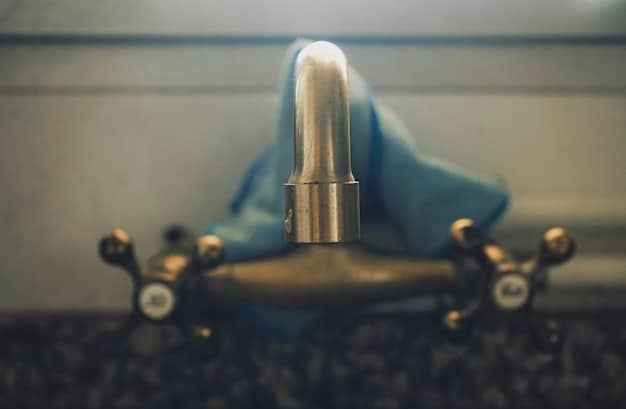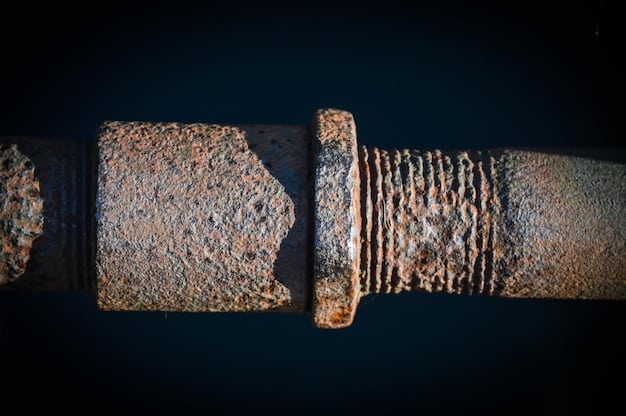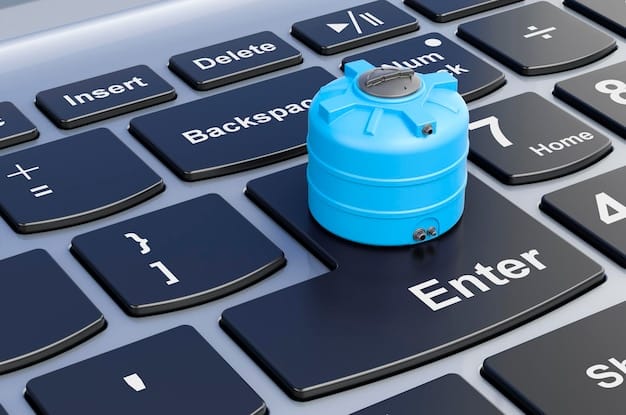Install a Water Softener: Protecting Your Home’s Plumbing

Anúncios
Installing a water softener protects your plumbing and appliances by removing hard minerals like calcium and magnesium, preventing scale buildup and extending the lifespan of your home’s water-using systems.
Have you ever wondered about the scaly buildup on your taps or the decreased efficiency of your appliances? The culprit might be hard water. Installing a water softener can be a game-changer, protecting your plumbing and appliances from the damaging effects of hard water.
Anúncios
Understanding Hard Water and Its Impact
Hard water is a common issue in many areas, characterised by high levels of minerals such as calcium and magnesium. While not a health hazard, hard water can wreak havoc on your home’s plumbing and appliances. Understanding the impact of hard water is the first step in deciding whether to install a water softener.
What is Hard Water?
Hard water forms when rainwater filters through soil and rock, dissolving minerals along the way. The concentration of these minerals determines the water’s hardness. The harder the water, the more pronounced the negative effects on your home.
Anúncios
The Effects of Hard Water on Plumbing
Hard water can cause scale buildup in pipes, reducing water flow and potentially leading to clogs. This scale acts as an insulator, decreasing the efficiency of water heaters and increasing energy bills.
- Scale buildup reduces pipe diameter and water pressure.
- Water heaters become less efficient, costing more to operate.
- Faucets and showerheads develop mineral deposits, affecting water flow.

In summary, understanding the source and effects of hard water is crucial for homeowners. Recognising these issues will pave the way for informed decisions about mitigating its impact on your home.
Benefits of Installing a Water Softener
Installing a water softener offers numerous benefits, from extending the lifespan of your appliances to improving the efficiency of your plumbing system. These systems provide a practical solution to many issues caused by hard water.
Appliance Protection
Water softeners help to protect appliances by reducing scale buildup in washing machines, dishwashers, and water heaters. This leads to increased efficiency and longevity, ultimately saving you money on repairs and replacements.
Improved Plumbing Efficiency
By preventing scale buildup in pipes, water softeners ensure optimal water flow and pressure throughout your home. This reduces the risk of clogs and expensive plumbing repairs.
- Reduces scale buildup in pipes, maintaining water flow.
- Extends the life of water-using appliances.
- Lowers energy costs associated with water heating.
In simple terms, a water softener acts as a shield for your home’s essential systems, providing long-term cost savings and reducing the hassle of constant repairs.
Types of Water Softeners Available
Choosing the right water softener can seem daunting, given the array of options available. Understanding the different types and their functionalities will help you make an informed decision tailored to your specific needs.
Salt-Based Water Softeners
Salt-based water softeners are the most common type, using ion exchange to remove minerals. They require regular salt replenishment and discharge brine during the regeneration process.
Salt-Free Water Softeners
Salt-free systems, also known as water conditioners, do not remove minerals but instead alter their structure to prevent scale buildup. They are environmentally friendly and require less maintenance.
- Salt-based softeners use ion exchange for effective mineral removal.
- Salt-free conditioners prevent scale without removing minerals.
- Consider household size, water hardness, and environmental concerns when choosing.
In conclusion, selecting the right water softener depends on your specific needs, budget, and environmental preferences. Researching the available options will ensure you choose the most suitable system for your home.

DIY vs. Professional Installation
Deciding whether to install a water softener yourself or hire a professional depends on your plumbing skills and comfort level. Both options have their pros and cons, which should be carefully considered.
DIY Installation Considerations
DIY installation can save money on labour costs but requires a good understanding of plumbing. Incorrect installation can lead to leaks and system malfunctions, potentially costing more in the long run.
Benefits of Professional Installation
Professional installation ensures the system is installed correctly, optimising its performance and lifespan. Plumbers can also advise on the best location and settings for your specific water conditions.
- DIY installation saves on labour but requires plumbing knowledge.
- Professional installation ensures accuracy and optimal performance.
- Consider the complexity of your plumbing system when deciding.
Therefore, assessing your skills and the complexity of the installation is crucial. While DIY can be cost-effective, professional installation offers peace of mind and guarantees a job well done.
Step-by-Step Guide to Installing a Water Softener (If DIY)
If you’re confident in your plumbing abilities and choose to install a water softener yourself, following a step-by-step guide is essential for success. This ensures you complete the installation safely and correctly.
Preparing for Installation
Start by gathering all necessary tools and materials, including pipe cutters, fittings, and Teflon tape. Turn off the main water supply and drain any remaining water from the pipes.
Connecting the Water Softener
Connect the inlet and outlet pipes to the water softener, ensuring a tight seal with Teflon tape. Install the drain line and connect it to a suitable drain location.
- Gather tools and materials before starting the installation.
- Connect pipes securely using Teflon tape to prevent leaks.
- Test the system for leaks after installation.
In summary, careful preparation, precise connections, and thorough testing are vital for a successful DIY water softener installation. Always refer to the manufacturer’s instructions for specific guidance.
Maintaining Your Water Softener for Longevity
Proper maintenance is key to ensuring your water softener operates efficiently and lasts for many years. Regular checks and upkeep will prevent common issues and extend the life of your system.
Regular Salt Replenishment
For salt-based systems, regularly replenish the salt supply to ensure optimal performance. Check the salt level monthly and add more as needed.
Cleaning and Inspection
Periodically clean the brine tank and check for any signs of damage or wear. Inspect the resin beads and replace them if they become fouled or ineffective.
- Replenish salt regularly in salt-based systems.
- Clean the brine tank and inspect for damage.
- Monitor water hardness and adjust settings as needed.
Ultimately, consistent maintenance will keep your water softener running smoothly, providing you with soft water and protecting your home from the damaging effects of hard water for years to come.
| Key Point | Brief Description |
|---|---|
| 💧 Hard Water | Contains high levels of minerals like calcium and magnesium. |
| 🔧 Water Softener Benefits | Protects appliances, improves plumbing, and reduces energy costs. |
| 🛠️ DIY vs. Professional | DIY saves money but requires plumbing skills; professional ensures correct installation. |
| 🧼 Maintenance | Regular salt replenishment and cleaning extend the life of your system. |
Frequently Asked Questions
▼
Signs of hard water include scale buildup on faucets, soap scum in showers, and difficulty lathering soap. A water hardness test can confirm the mineral levels in your water.
▼
Check the salt levels monthly and replenish as needed. The frequency depends on water usage and the size of your softener. Keep the tank at least one-third full.
▼
If properly sized and maintained, a water softener should not significantly affect water pressure. Scale buildup in pipes can, however, and a softener prevents this.
▼
Salt-free systems condition water to prevent scale but don’t remove minerals. Salt-based systems remove minerals, providing softer water. Choose based on your needs.
▼
With proper maintenance, a water softener can last 10-15 years. Regular cleaning and timely repairs can extend its lifespan considerably.
Conclusion
Installing a water softener is a worthwhile investment to protect your plumbing and appliances from the damaging effects of hard water. By understanding the types of systems available, weighing the pros and cons of DIY versus professional installation, and implementing a regular maintenance schedule, you can ensure your home benefits from softened water for years to come.





